Unit10 You are supposed to shake hands Section B课件
文档属性
| 名称 | Unit10 You are supposed to shake hands Section B课件 |

|
|
| 格式 | zip | ||
| 文件大小 | 4.5MB | ||
| 资源类型 | 教案 | ||
| 版本资源 | 人教新目标(Go for it)版 | ||
| 科目 | 英语 | ||
| 更新时间 | 2018-07-13 00:00:00 | ||
图片预览





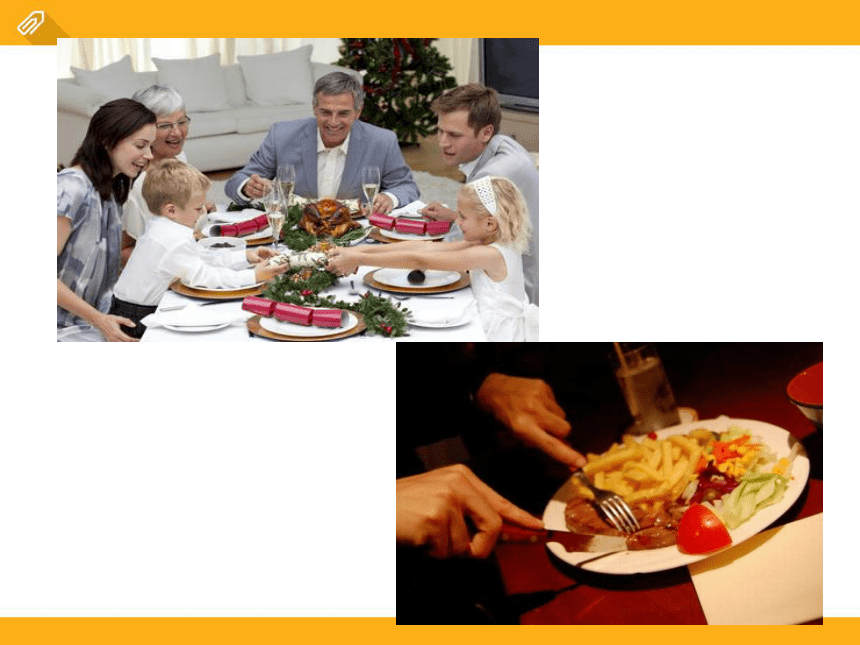
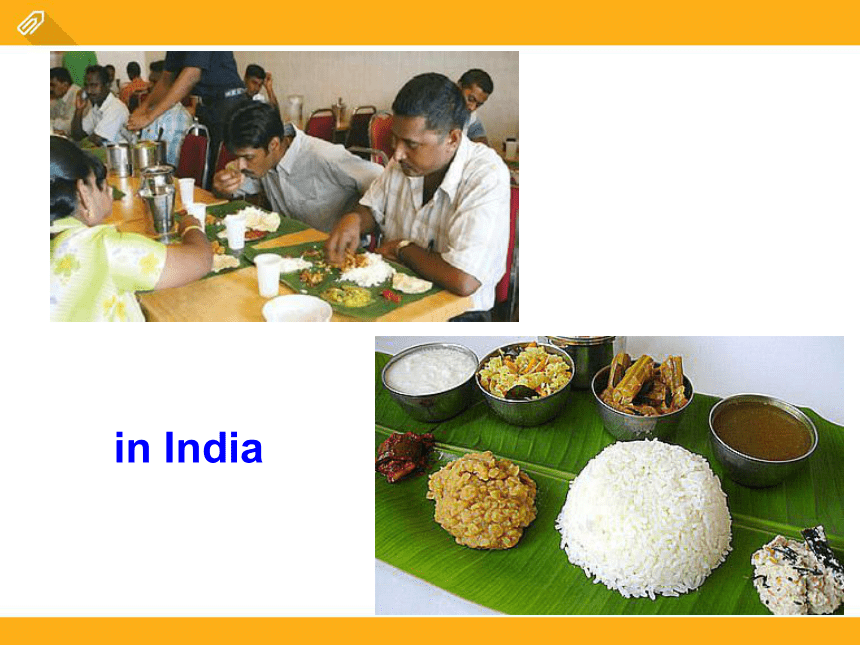

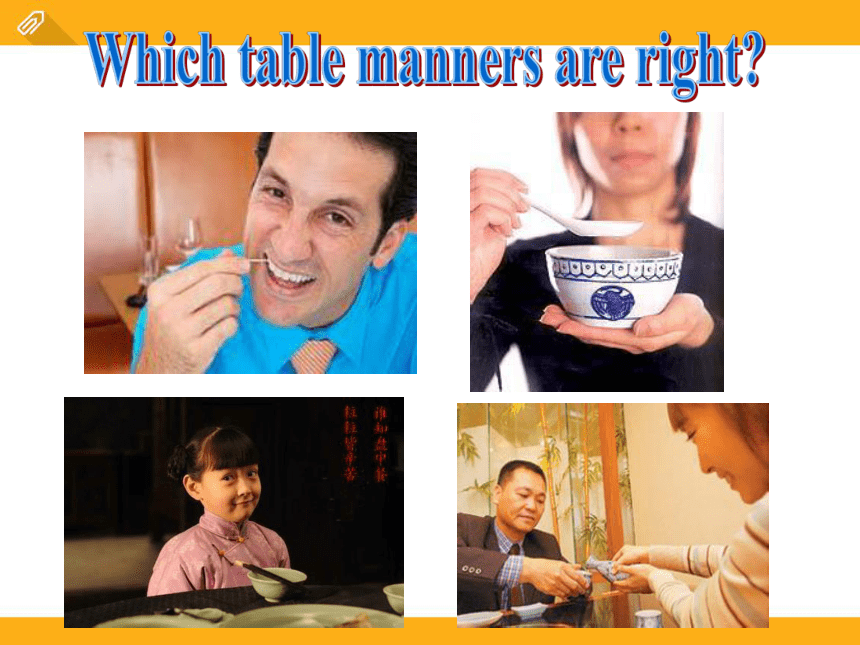
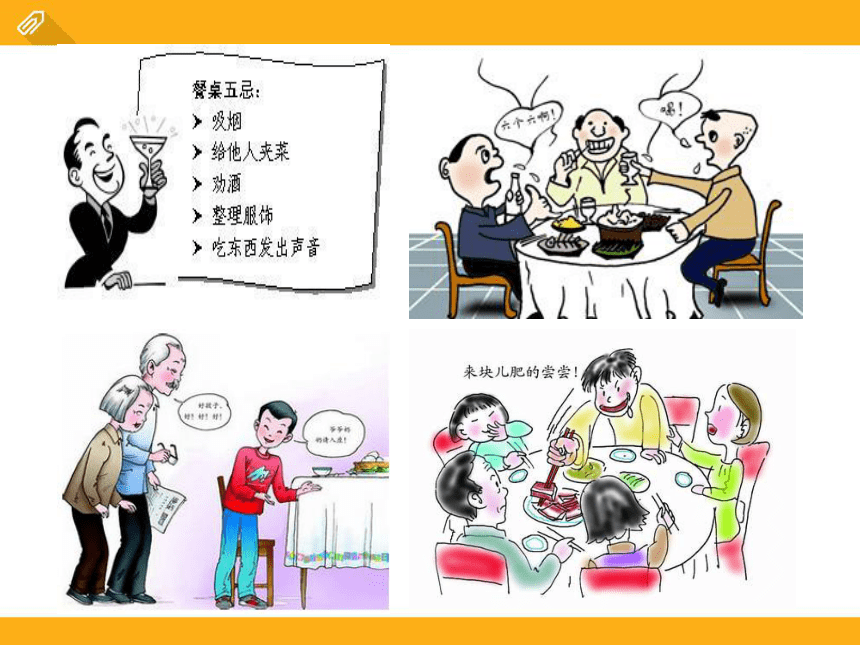
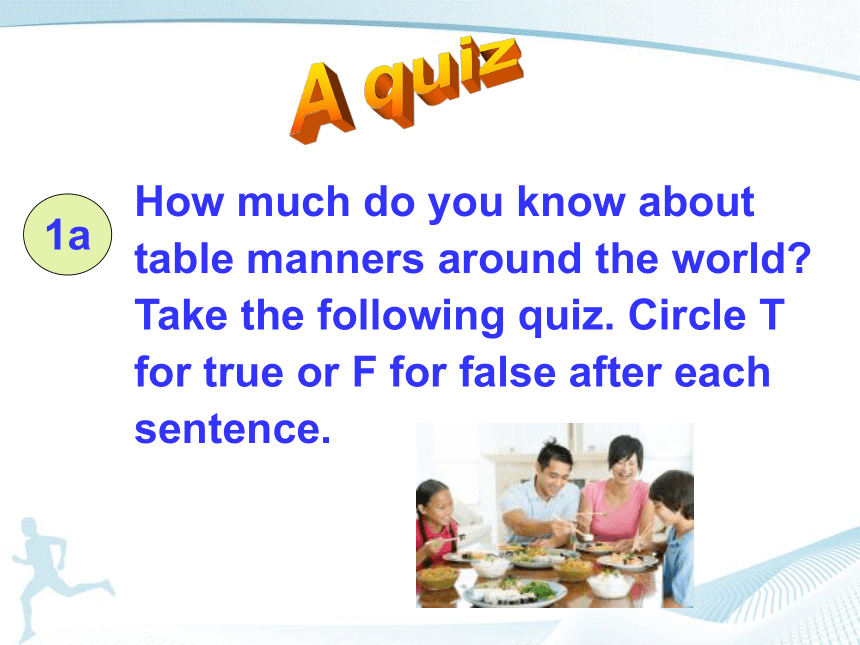
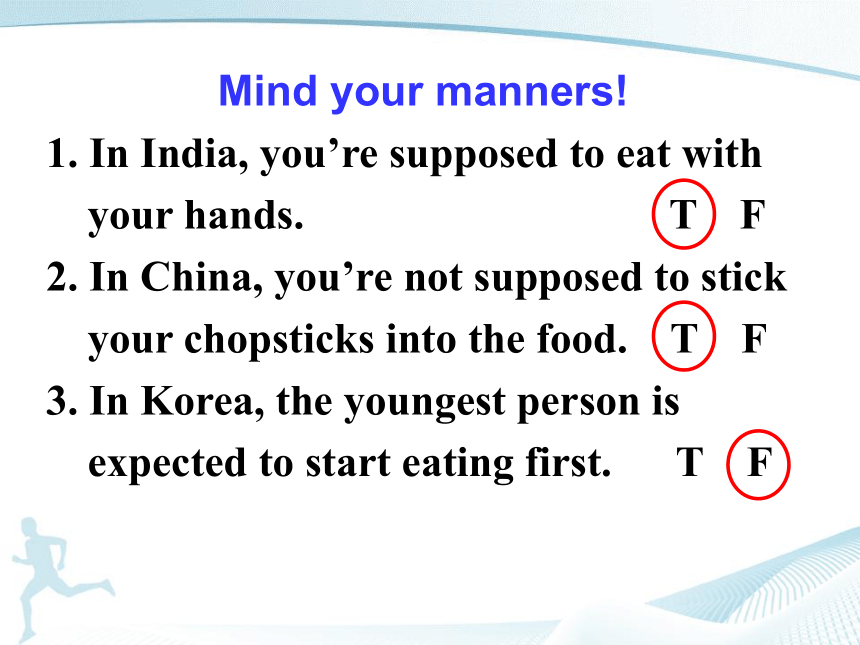
文档简介
课件71张PPT。Unit 9Unit 10
You're supposed to shake hands.Section B1
1a-1dRevisionShare your passage about customs in Colombia and Switzerland. Warming uptable manners in foreign countriesin Francein Indiain ChinaWhich table manners are right?1aHow much do you know about table manners around the world? Take the following quiz. Circle T for true or F for false after each sentence.A quizMind your manners!
1. In India, you’re supposed to eat with your hands. T F
2. In China, you’re not supposed to stick your chopsticks into the food. T F
3. In Korea, the youngest person is expected to start eating first. T F4. In France, you’re supposed to put your bread on the table. T F
5. In China, it’s impolite to use your chopsticks to hit an empty bowl. T F123Listening1bSteve is going to China to study. His friend Yang Ming is telling him about the table manners in China. Listen and number the pictures in the order you hear them.Listen again. Match the sentence parts.acb1cA: We are supposed to…
B: Yes, and it’s impolite to…DiscussionTalk about other table manners in your country.1dTalk about Chinese table manners in group of four and write down your opinions. 1. You’re not supposed to start eating first if there are older people at the table.
2. You shouldn’t point at anyone with your chopsticks.
3. It’s impolite to stick your chopsticks into your food.4. It’s impolite to use your chopsticks to hit an empty bowl.
5. You are not supposed to talk when you’re having dinner.
6. It’s not necessary to order too many dishes. 7. It’s impolite to make a big noise when you are eating soup.
8. You’re not supposed to put your clothes into a bowl or plate when picking up your food with chopsticks. Ⅰ. 从方框中选词并用其正确形式填空
You’d better not talk loudly or laugh while
______ at the table.
2. You are not supposed ______ at anyone
with your chopsticks.Exercisepoint, polite, make noise, stick, eateatingto point 3. It’s ___________ to speak with your mouth
full.
4. Don’t ___________ your chopsticks into the
food.
5. Be quiet! You shouldn’t _____________ in
the library.impolitestickmake noiseⅡ. 单项选择
--- When ______ you supposed to ______
the meeting yesterday?
---- At nine a.m.
A. were;had B. was;had
C. were;have D. was;have2. It’s impolite ______ loudly in public places.
A. speak B. to speak
C. speaking D. speaks
3. ---You should keep quiet ______ having
dinner.
---OK, I’ll have it in mind.
A. when you B. while
C. without D. to4. You are supposed to _______ school on time.
A. get B. reach to
C. arrive D. get to
5. The ticket is on the floor. Please ______ .
A. pick up it B. picking up it
C. pick it up D. look for it Table Manners in ChinaTalking about eating habits, unlike the West where everyone has their own plate of food, in China the dishes are placed on the table and everybody shares. Chinese are very proud of their culture of cooking and will do their best to show their hospitality. And sometimes the host will serve some dishes with his or her own chopsticks to guests to show his or her hospitality. This is a sign of politeness. The right thing to do would be to eat the
whatever it is and
say how yummy it is. If you feel uncomfortable with this, you can just say "thank you" politely and leave the food there. There are some other rules about the eating custom in China.Make sure the spout (茶壶的嘴) of the teapot is not facing anyone. It is impolite to set the spout facing towards somebody. The spout should always be directed to where nobody is sitting, usually just outward from the table. Never try to turn a fish over yourself. People believe that car accidents will happen or a fishing boat will capsize (翻) if you do so. This is especially true to southerners in China (such as Guangdong, Guangxi and Fujian provinces, etc.) Thank You!Section B2
2a-2ebasic
exchange
go out of one’s way
make…feel at home
teenage
granddaughter
adj. 基本的;基础的
v. & n. 交换
特地;格外努力
使……感到宾至如归
adj. 十几岁的;青少年的
n. (外)孙女Words and Expressionsbehave
except
elbow
gradually
get used to
v. 举止;表现
prep. 除……之外
conj. 除了;只是
n. 肘;胳膊
adv. 逐步地;渐进地
习惯于Words and ExpressionsDo you know these places in France?Have you ever eaten French cuisine?1. Li Yue enjoys her exchange life in
France. ( )
2. Li Yue was never nervous before she
arrived in France. ( )
3. People are supposed to put their bread on their plates. ( )Reading Read the passage and check the sentences (T or F).T F F Fast readingCareful readingRead the letter and answer the questions.2b1. Why is Li Yue in France?She is an exchange student in France. 2. Does she enjoy staying with her host family? How do you know?
Yes, she does. She say her host family is really nice and they go out of their way to make her feel at home.
3.How does she feel about making mistakes when she speaks French?
It doesn’t worry her like it used to be. 4. What is the biggest challenge
she is facing?
Her biggest challenge is learning
how to behave at the dinner table.be comfortable (doing)went out of their way(something) worry (someone) Read the sentences and replace the underlined words with the phrases in the box.gradually gotten used to being2c1. Making mistakes in French used to make Lin Yue nervous.
( (something) worry (someone) )
2. It was quite hard for her to feel good about speaking French
( be comfortable (doing) )
3. The host family tried very hard to help Lin Yue.
(went out of their way)
4. Lin Yue has slowly learned how to be like her French friends.
(gradually gotten used to being)
Review the passage and make notes about French customs in the chart.2dput your bread on your plate.cut up your fruit and eat it with a forkeat anything with your hands except breadsay “that was delicious” if you don’t want any more food.say you’re fullput your elbows on the tableLet’s learn some
language points1. They go out of their way to make me feel at home.
go out of one’s way 特地;格外努力
e.g. John went out of his way to make
his girl friend happy.
约翰想方设法使他的女朋友高
兴。make sb. feel at home 使某人感到宾至如归
e.g. I’m doing everything I can to make
them feel at home.
我在尽我一切所能使他们感到宾至
如归。2. You wouldn’t believe how quickly my French has improved because of that.
You wouldn’t believe …是一个常用句式,相当于汉语所说的“你无法想象……;你想都想不到……;你绝不会相信……”,表示所陈述的事情超出想象之外。与此类似的表达还有You would never believe…或You would hardly believe…。例如:You wouldn’t believe that he found his long-lost sister in Taiwan!
你绝对想不到他在台湾找到了失散多年的姐姐!
You would never believe what quick progress he’s made ever since he attended your class.
你根本无法想象,自从他听了您的讲课后进步有多大。3. My biggest challenge is learning how to behave at the dinner table.
learning how to behave at the table是现在分词短语,在此用作句子的表语。再如:
His main hobby is fishing.
他的主要爱好是钓鱼。
The most important thing is getting there in time. 最重要的事是及时到达那里。behave
【讲解】behave是不及物动词,意为“表现;行为”,behave well / badly表示“表现好/糟糕”。它的名词形式behaviour (举止;行为),是不可数名词。【运用】请根据汉语意思补全英语句
子,每空一词。
(1) 如果你那样表现,你会让人厌恶的。
____ you _______ like that, you’ll get yourself disliked.
(2) 如此的行为可能招致麻烦。
_____ _________ may cause trouble.If behaveSuch behaviour 4. You’re not supposed to eat anything with your hands except bread, not even fruit! 除了面包之外,你什么都不能用手拿着吃,甚至连水果也不能!
解析: except意为“除……之外”,不包括后面的内容。 Everyone in our class has seen the film ______ Tom.
A. besides B. beside C. except D. expect
解析 :选C。句意:我们班上除汤姆外,都看过这部电影了。except作介词,意为“除……之外”,不包含其后的人或物。1)except 意为“除…之外”不包括后面内容。
Except B : A--B A、B 同类ABExcept/besides/ but/except for2) Besides 意为“除..之外还有…”包括besides 后面的内容。
Besides B : A +BAB3)but, but 与except 同义,如果句中有no one, nobody, nothing, all, everyone, everything, 多用but。
4)except for意为“除…之外”说明整体情况后,对细节加以纠正。
Except for B: A—B, A、B不同类,B为A部分加以修正的部分。AB5. … but I’m gradually getting used to it. get used to 习惯于
e.g. We get used to this way of
speaking.
我们习惯了这种说话方式。① be/get used to sth./doing sth. 习惯于…
e.g. He got used to living in the
country.
他习惯住在乡下。
② used to do sth. 过去常常做某事(现
在不做了)
e.g. He used to plant roses.
他过去常常种植玫瑰。辨析2. I have to say, I find it difficult to remember everything, but I’m gradually getting used to things and don’t find them so strange any more.
我不得不说,我觉得记住所有的规矩是很难的,但是我也渐渐习惯了这些,不再觉得它们奇怪了。(1)在 I find it difficult to remember . . . 句中,it是形式宾语,真正的宾语是后面的动词不定式短语to remember everything。其句型结构为:find+ it + adj. + to do sth. 。类似用法的动词还有:think, believe, know, feel等。
(2)be/get used to 意为“习惯于……”,
后接名词、代词或动名词。 ①I find ______ important to get along well with others.
A. that B. this C. it D. them
解析:选C。本题考查it 作形式宾语的用法。句中it代替不定式短语 “to get along well with others”作形式宾语。根据句意完成句子, 每空一词。
1. 你不会相信我的法语进步得多快!
You wouldn’t believe ______ ______ my
French has improved!
2. 他们尽力让我感觉像在家里一样。
They ______ ______ ______ their way ______ ______ me ______ at home. Exercisehow quicklygo out oftomakefeel3. 虽然我仍然犯许多错误,但它不像以前那
样困扰我了。
Although I still make lots of mistakes, it
doesn’t worry me like it ______ ______.
4. 我觉得记住所有的规矩是很难的,但是我
也渐渐习惯了这些,不再觉得它们奇怪了。
I find it difficult ___ _________ all rules,
but I’m gradually ______ ______ ______
these and don’t find them so strange any
more. used toto remember getting used to 把下列汉语翻译成英语。
1. 我们今天应该几点到学校?
______________________________________________
2. 我去博物馆时, 顺便去了我的同学家。
______________________________________________
______________________________________________
3. 我过去常常吃肉, 但现在我习惯吃蔬菜。
______________________________________________
______________________________________________ When are we supposed to get to school today?I dropped by my classmate’s home when I went to the museum.I used to eat meat, but now I am / get used to eating vegetables. 单项选择
I like gentle music that can make us ______
relaxed.
A. feels B. felt
C. feel D. feeling
2. There are many trees on ______ side of the road.
A. both B. each
C. every D. none4. He ______ live with his friends, but he ______ living alone now.
used to; used to
B. is used to; is used to
C. is used to; used to
D. used to; is used to
5. All of us find ______ necessary to take exercise every day.
A. it B. them C. this D. thatThank You!
You're supposed to shake hands.Section B1
1a-1dRevisionShare your passage about customs in Colombia and Switzerland. Warming uptable manners in foreign countriesin Francein Indiain ChinaWhich table manners are right?1aHow much do you know about table manners around the world? Take the following quiz. Circle T for true or F for false after each sentence.A quizMind your manners!
1. In India, you’re supposed to eat with your hands. T F
2. In China, you’re not supposed to stick your chopsticks into the food. T F
3. In Korea, the youngest person is expected to start eating first. T F4. In France, you’re supposed to put your bread on the table. T F
5. In China, it’s impolite to use your chopsticks to hit an empty bowl. T F123Listening1bSteve is going to China to study. His friend Yang Ming is telling him about the table manners in China. Listen and number the pictures in the order you hear them.Listen again. Match the sentence parts.acb1cA: We are supposed to…
B: Yes, and it’s impolite to…DiscussionTalk about other table manners in your country.1dTalk about Chinese table manners in group of four and write down your opinions. 1. You’re not supposed to start eating first if there are older people at the table.
2. You shouldn’t point at anyone with your chopsticks.
3. It’s impolite to stick your chopsticks into your food.4. It’s impolite to use your chopsticks to hit an empty bowl.
5. You are not supposed to talk when you’re having dinner.
6. It’s not necessary to order too many dishes. 7. It’s impolite to make a big noise when you are eating soup.
8. You’re not supposed to put your clothes into a bowl or plate when picking up your food with chopsticks. Ⅰ. 从方框中选词并用其正确形式填空
You’d better not talk loudly or laugh while
______ at the table.
2. You are not supposed ______ at anyone
with your chopsticks.Exercisepoint, polite, make noise, stick, eateatingto point 3. It’s ___________ to speak with your mouth
full.
4. Don’t ___________ your chopsticks into the
food.
5. Be quiet! You shouldn’t _____________ in
the library.impolitestickmake noiseⅡ. 单项选择
--- When ______ you supposed to ______
the meeting yesterday?
---- At nine a.m.
A. were;had B. was;had
C. were;have D. was;have2. It’s impolite ______ loudly in public places.
A. speak B. to speak
C. speaking D. speaks
3. ---You should keep quiet ______ having
dinner.
---OK, I’ll have it in mind.
A. when you B. while
C. without D. to4. You are supposed to _______ school on time.
A. get B. reach to
C. arrive D. get to
5. The ticket is on the floor. Please ______ .
A. pick up it B. picking up it
C. pick it up D. look for it Table Manners in ChinaTalking about eating habits, unlike the West where everyone has their own plate of food, in China the dishes are placed on the table and everybody shares. Chinese are very proud of their culture of cooking and will do their best to show their hospitality. And sometimes the host will serve some dishes with his or her own chopsticks to guests to show his or her hospitality. This is a sign of politeness. The right thing to do would be to eat the
whatever it is and
say how yummy it is. If you feel uncomfortable with this, you can just say "thank you" politely and leave the food there. There are some other rules about the eating custom in China.Make sure the spout (茶壶的嘴) of the teapot is not facing anyone. It is impolite to set the spout facing towards somebody. The spout should always be directed to where nobody is sitting, usually just outward from the table. Never try to turn a fish over yourself. People believe that car accidents will happen or a fishing boat will capsize (翻) if you do so. This is especially true to southerners in China (such as Guangdong, Guangxi and Fujian provinces, etc.) Thank You!Section B2
2a-2ebasic
exchange
go out of one’s way
make…feel at home
teenage
granddaughter
adj. 基本的;基础的
v. & n. 交换
特地;格外努力
使……感到宾至如归
adj. 十几岁的;青少年的
n. (外)孙女Words and Expressionsbehave
except
elbow
gradually
get used to
v. 举止;表现
prep. 除……之外
conj. 除了;只是
n. 肘;胳膊
adv. 逐步地;渐进地
习惯于Words and ExpressionsDo you know these places in France?Have you ever eaten French cuisine?1. Li Yue enjoys her exchange life in
France. ( )
2. Li Yue was never nervous before she
arrived in France. ( )
3. People are supposed to put their bread on their plates. ( )Reading Read the passage and check the sentences (T or F).T F F Fast readingCareful readingRead the letter and answer the questions.2b1. Why is Li Yue in France?She is an exchange student in France. 2. Does she enjoy staying with her host family? How do you know?
Yes, she does. She say her host family is really nice and they go out of their way to make her feel at home.
3.How does she feel about making mistakes when she speaks French?
It doesn’t worry her like it used to be. 4. What is the biggest challenge
she is facing?
Her biggest challenge is learning
how to behave at the dinner table.be comfortable (doing)went out of their way(something) worry (someone) Read the sentences and replace the underlined words with the phrases in the box.gradually gotten used to being2c1. Making mistakes in French used to make Lin Yue nervous.
( (something) worry (someone) )
2. It was quite hard for her to feel good about speaking French
( be comfortable (doing) )
3. The host family tried very hard to help Lin Yue.
(went out of their way)
4. Lin Yue has slowly learned how to be like her French friends.
(gradually gotten used to being)
Review the passage and make notes about French customs in the chart.2dput your bread on your plate.cut up your fruit and eat it with a forkeat anything with your hands except breadsay “that was delicious” if you don’t want any more food.say you’re fullput your elbows on the tableLet’s learn some
language points1. They go out of their way to make me feel at home.
go out of one’s way 特地;格外努力
e.g. John went out of his way to make
his girl friend happy.
约翰想方设法使他的女朋友高
兴。make sb. feel at home 使某人感到宾至如归
e.g. I’m doing everything I can to make
them feel at home.
我在尽我一切所能使他们感到宾至
如归。2. You wouldn’t believe how quickly my French has improved because of that.
You wouldn’t believe …是一个常用句式,相当于汉语所说的“你无法想象……;你想都想不到……;你绝不会相信……”,表示所陈述的事情超出想象之外。与此类似的表达还有You would never believe…或You would hardly believe…。例如:You wouldn’t believe that he found his long-lost sister in Taiwan!
你绝对想不到他在台湾找到了失散多年的姐姐!
You would never believe what quick progress he’s made ever since he attended your class.
你根本无法想象,自从他听了您的讲课后进步有多大。3. My biggest challenge is learning how to behave at the dinner table.
learning how to behave at the table是现在分词短语,在此用作句子的表语。再如:
His main hobby is fishing.
他的主要爱好是钓鱼。
The most important thing is getting there in time. 最重要的事是及时到达那里。behave
【讲解】behave是不及物动词,意为“表现;行为”,behave well / badly表示“表现好/糟糕”。它的名词形式behaviour (举止;行为),是不可数名词。【运用】请根据汉语意思补全英语句
子,每空一词。
(1) 如果你那样表现,你会让人厌恶的。
____ you _______ like that, you’ll get yourself disliked.
(2) 如此的行为可能招致麻烦。
_____ _________ may cause trouble.If behaveSuch behaviour 4. You’re not supposed to eat anything with your hands except bread, not even fruit! 除了面包之外,你什么都不能用手拿着吃,甚至连水果也不能!
解析: except意为“除……之外”,不包括后面的内容。 Everyone in our class has seen the film ______ Tom.
A. besides B. beside C. except D. expect
解析 :选C。句意:我们班上除汤姆外,都看过这部电影了。except作介词,意为“除……之外”,不包含其后的人或物。1)except 意为“除…之外”不包括后面内容。
Except B : A--B A、B 同类ABExcept/besides/ but/except for2) Besides 意为“除..之外还有…”包括besides 后面的内容。
Besides B : A +BAB3)but, but 与except 同义,如果句中有no one, nobody, nothing, all, everyone, everything, 多用but。
4)except for意为“除…之外”说明整体情况后,对细节加以纠正。
Except for B: A—B, A、B不同类,B为A部分加以修正的部分。AB5. … but I’m gradually getting used to it. get used to 习惯于
e.g. We get used to this way of
speaking.
我们习惯了这种说话方式。① be/get used to sth./doing sth. 习惯于…
e.g. He got used to living in the
country.
他习惯住在乡下。
② used to do sth. 过去常常做某事(现
在不做了)
e.g. He used to plant roses.
他过去常常种植玫瑰。辨析2. I have to say, I find it difficult to remember everything, but I’m gradually getting used to things and don’t find them so strange any more.
我不得不说,我觉得记住所有的规矩是很难的,但是我也渐渐习惯了这些,不再觉得它们奇怪了。(1)在 I find it difficult to remember . . . 句中,it是形式宾语,真正的宾语是后面的动词不定式短语to remember everything。其句型结构为:find+ it + adj. + to do sth. 。类似用法的动词还有:think, believe, know, feel等。
(2)be/get used to 意为“习惯于……”,
后接名词、代词或动名词。 ①I find ______ important to get along well with others.
A. that B. this C. it D. them
解析:选C。本题考查it 作形式宾语的用法。句中it代替不定式短语 “to get along well with others”作形式宾语。根据句意完成句子, 每空一词。
1. 你不会相信我的法语进步得多快!
You wouldn’t believe ______ ______ my
French has improved!
2. 他们尽力让我感觉像在家里一样。
They ______ ______ ______ their way ______ ______ me ______ at home. Exercisehow quicklygo out oftomakefeel3. 虽然我仍然犯许多错误,但它不像以前那
样困扰我了。
Although I still make lots of mistakes, it
doesn’t worry me like it ______ ______.
4. 我觉得记住所有的规矩是很难的,但是我
也渐渐习惯了这些,不再觉得它们奇怪了。
I find it difficult ___ _________ all rules,
but I’m gradually ______ ______ ______
these and don’t find them so strange any
more. used toto remember getting used to 把下列汉语翻译成英语。
1. 我们今天应该几点到学校?
______________________________________________
2. 我去博物馆时, 顺便去了我的同学家。
______________________________________________
______________________________________________
3. 我过去常常吃肉, 但现在我习惯吃蔬菜。
______________________________________________
______________________________________________ When are we supposed to get to school today?I dropped by my classmate’s home when I went to the museum.I used to eat meat, but now I am / get used to eating vegetables. 单项选择
I like gentle music that can make us ______
relaxed.
A. feels B. felt
C. feel D. feeling
2. There are many trees on ______ side of the road.
A. both B. each
C. every D. none4. He ______ live with his friends, but he ______ living alone now.
used to; used to
B. is used to; is used to
C. is used to; used to
D. used to; is used to
5. All of us find ______ necessary to take exercise every day.
A. it B. them C. this D. thatThank You!
同课章节目录
- Unit 1 How can we become good learners.
- Section A
- Section B
- Unit 2 I think that mooncakes are delicious!
- Section A
- Section B
- Unit 3 Could you please tell me where the restroom
- Section A
- Section B
- Unit 4 I used to be afraid of the dark.
- Section A
- Section B
- Unit 5 What are the shirts made of?
- Section A
- Section B
- Review of Units 1-5
- Unit 6 When was it invented?
- Section A
- Section B
- Unit 7 Teenagers should be allowed to choose their
- Section A
- Section B
- Unit 8 It must belong to Carla.
- Section A
- Section B
- Unit 9 I like music that I can dance to.
- Section A
- Section B
- Unit 10 You're supposed to shake hands.
- Section A
- Section B
- Review of Units 6-10
- Unit 11 Sad movies make me cry.
- Section A
- Section B
- Unit 12 Life is full of the unexpected
- Section A
- Section B
- Unit 13 We're trying to save the earth!
- Section A
- Section B
- Unit 14 I remember meeting all of you in Grade 7.
- Section A
- Section B
- Review of Units 11-14
